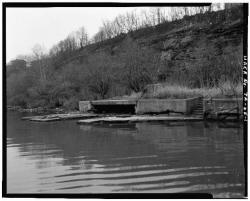
Before the Davis Island Lock & Dam were built, the flow of the Ohio River slowed to little more than a trickle during dry periods. For several months each year, the unreliable flow stranded Pittsburgh's steamboats, towboats, and barges.
The Davis Island Lock & Chanoine Dam experimental project was the first lock and dam ever constructed on the Ohio River. Its achievements also included the first rolling lock gates, the largest movable dam built in the 19th century, and the widest chamber in world history.
The lock and dam proved so successful that the concept was used as the prototype to create 50 additional locks and dams that spanned the entire length of the Ohio River. The reliable river depth created by the prototype led to the development of various marine engineering achievements, including the diesel towboat and the standard welded steel barge. The project provided a stimulus for waterborne commerce and motivated industrial and commercial development around the Port of Pittsburgh.
Facts
- It took the U.S. Army Corps of Engineers seven years and 19 days to complete the project, which ultimately cost $810,000.
- The distance between the lock gates was 600 feet. The width of the lock was 110 feet.
- Noteworthy are the slips, or recesses, built to receive water when the gates were opened. These were built toward the shore, 120 feet from the lock.
- The lock was 689 long and 19 = feet tall, with an 11-foot-thick wall.
- The floor of the dam was composed of 12 by 12-inch white oak timbers, embedded in concrete.
- The dam was forced by a series of wickets extending across the river. Each wicket measured 3 by 9 inches wide.
- The lock and dam were removed in 1922 and replaced by the Emsworth Locks and Dams, but the lessons learned from the experiment provided insights that improved engineering practices for future inland river navigation systems.
Resources
- The Davis Island Lock and Dam, 1870-1922, Leland R. Johnson, U.S. Army Corps of Engineers, 1985.


